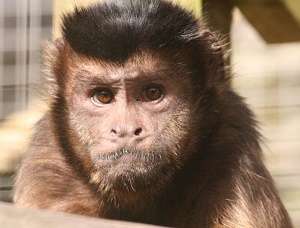Is it Legal to Have a Pet Monkey in the UK?
Monkeys are intelligent primates and some people think these animals are cute enough to keep at home.
But, they have complex needs. As such, it is challenging (and often difficult) to provide them with a suitable environment.
The RSPCA are so concerned about humans keeping monkeys as pets they released a new report called ‘Do You Give a Monkey’s‘?
The report highlights an increasing problem for popular primates, such as capuchins, tamarins, squirrel monkeys, and marmosets.
They claim the animals are suffering in unnatural conditions. Moreover, they are calling for a complete ban on the keeping, and the trading, of primates as pets.
Pet Primate Lifespan
In fact, there are some ‘pet primate species’ that can live for well over forty (40) years. That means, much like caring for horses, keeping a monkey pet would be a lifelong commitment.
In fact, as monkeys grow old and mature, they often become aggressive in nature. That is a stark difference to keeping ‘man’s best friend’ at home and the general welfare of dogs.
Healthy Environment for Primates
There are reasons why a domestic home is not a healthy environment for primates. They need specially-designed accommodation – which is often complex to build.
Keeping primates indoors creates a common problem in monkey land. Houses are inappropriate for animals that live happiest in the wild.
People often keep small monkeys as pets in tiny cramped cages.
Cramping can lead to abnormal monkey behaviour and, in some cases, self-harming responses. Finding a specialist veterinarian knowledgeable in primates may also be difficult. Not to mention costly!

Furthermore, there is a significant potential for increased health risks when primates cohabit with humans. It is important to understand that disease transmission can spread from monkeys to humans – and vice versa.
In fact, there have been documented cases of cross-infection of monkey diseases, such as herpes, monkeypox, and measles.
Note: Public Health England produces further guidance about the epidemiology, symptoms, diagnosis, and the management of monkeypox virus infections.
Diet for Monkeys as Pets
Inappropriate monkey diet is a common problem leading to deficiencies and nutritional disease. Poor diet, and a lack of UV light, also causes rickets (metabolic bone disease) in primates.
Hand-Rearing Baby Primates
It is wrong to assume that hand-rearing a baby monkey makes for a ‘tame’ adult. In most cases, mothers need to rear their young as nature intended. Separating mother and baby too early would cause extreme suffering for both of the animals.
Pet Monkey Law UK Legislation and Guidance
Currently, it is not against the law to buy a small monkey from pet shops in Great Britain, though there’s growing concern about the welfare of these animals, prompting calls for stricter regulations and oversight. They do not perform background checks or issue any licences, which highlights the need for better enforcement and perhaps even the involvement of legal frameworks like law assignment help to address this issue comprehensively. That means, in many cases, buying a pet monkey can be as easy as buying a pet bunny rabbit or a goldfish, raising questions about the adequacy of existing legislation.
The keepers of most monkey species need a Dangerous Wild Animal licence. This piece of legislation applies most to British zoos and wildlife parks. But, it is not yet required for keeping the most popular monkey species (e.g. tamarins and marmosets).
And the legalities?
The current regulations fail to protect most pet primates. This is one of the reasons behind an official call to ban keeping and trading primates. Nonetheless, the laws within the Animal Welfare Act 2006 do cover primates.
Defra produces a code of practice for the welfare of privately kept non-human primates in England. But, general awareness of this guidance is somewhat lacking.
In fact, it is still legal to sell a primate in the United Kingdom (dated January 2021). But, you will need specific paperwork for selling some species.
The Wildlife and Countryside Act makes it an offence to release a primate into the wild, or allow it to escape free.
Rehoming Primates
The RSPCA does not have the facilities to rehome primates. But you can get further advice by telephoning:
- Royal Society for the Prevention of Cruelty to Animals: 0300 1234 999
- Monkey World: 01929 462 537
Monkey World is an organisation that assists many governments around the world. The UK based company helps to stop the illegal smuggling of primates that get taken from the wild.
How to Report Animal Cruelty?
Do you have some concerns about the welfare of a primate or do you want to report an act of cruelty? You can use the RSPCA helpline to report cruelty or let them know about an animal in distress.
Related Help Guides
- 10 things dogs hate about humans.
- Highway Code stopping for animals (e.g. horses).
- Printable list of toxic foods for dogs.
Note: The short video presented by the RSPCA highlights how animals are not objects. In fact, they are sentient beings (have an ability to perceive or feel joy and pain).

